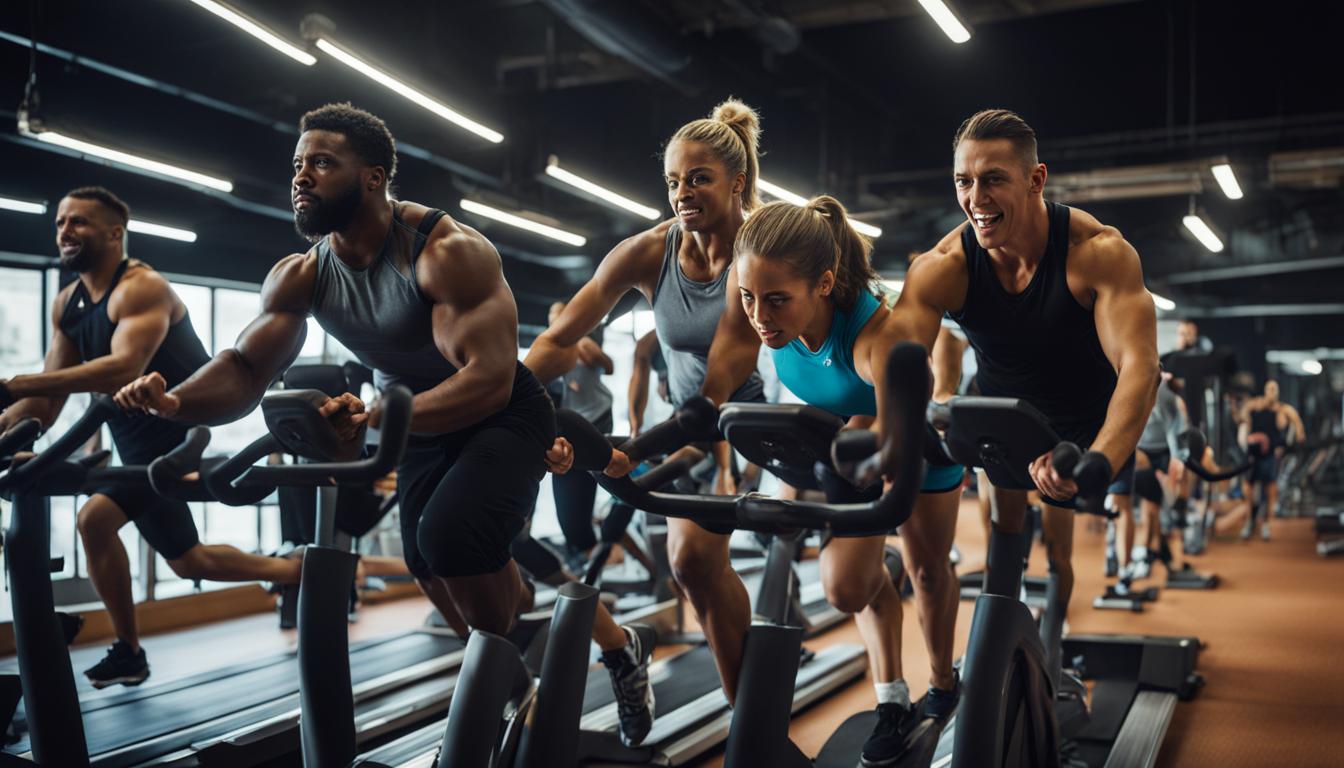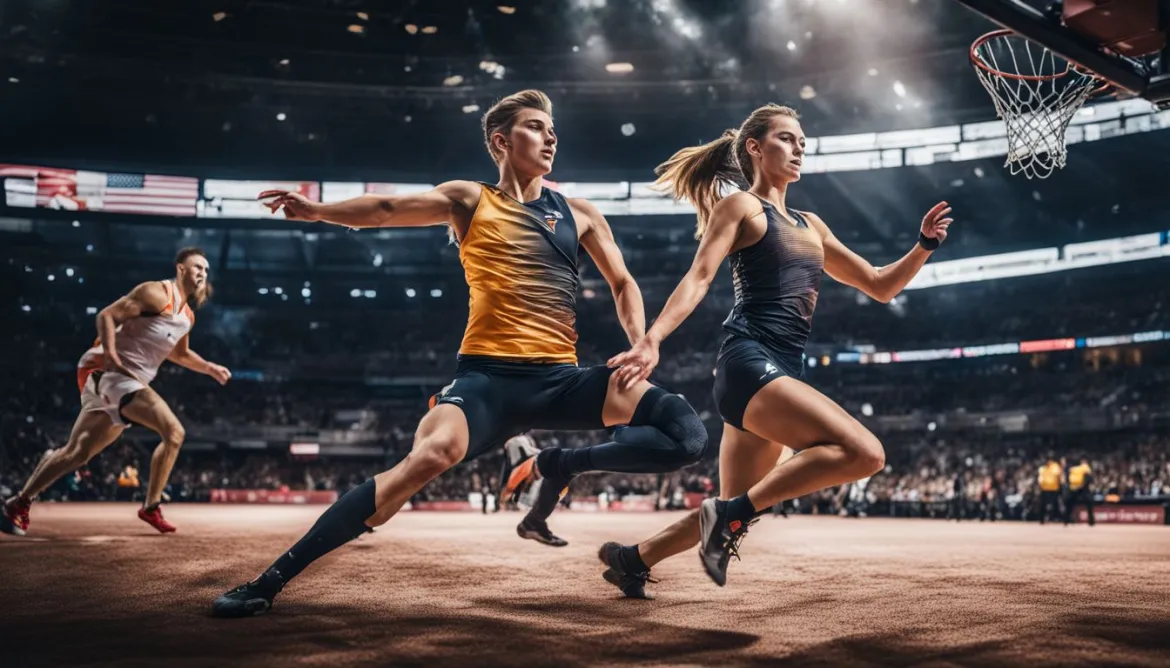Gaining access to athletes and building strong relationships with them are essential for brands and individuals looking to enhance their visibility and create partnership opportunities in the world of sports. Whether you are a sponsor, marketer, or coach, having a genuine connection with athletes can open doors to new collaborations and drive mutual success.
In this article, we will provide you with tips and strategies on how to effectively work with athletes, focusing on gaining access and building meaningful relationships. Through research and expert insights, we will explore the importance of the coach-athlete relationship, positive relationship skills for coaches, and the power of effective coach-team relationships.
So, whether you are looking to establish partnerships, support athlete development, or improve team performance, read on to discover actionable advice and best practices that can help you in your journey of working with athletes.
Key Takeaways:
- Building strong relationships with athletes is crucial for enhancing brand visibility and partnership opportunities.
- The coach-athlete relationship is vital for athlete development and team performance.
- Coaches who prioritize positive, personal relationships with athletes foster an environment of trust and growth.
- Effective coaches exhibit skills such as honesty, empathy, and support, creating opportunities for mentorship and connection.
- Avoiding negative relationship characteristics, such as lack of interest and poor sportsmanship, is crucial for maintaining healthy coach-athlete dynamics.
The Importance of the Coach-Athlete Relationship
The coach-athlete relationship plays a pivotal role in athlete development and team performance. When coaches prioritize positive and personal connections with their athletes, it fosters an environment of trust and growth. By striking a balance between rationale and empathy, coaches can establish a strong foundation for the team’s success.
Building a solid coach-athlete relationship is vital for athlete development. When athletes feel connected to their coach, they are more likely to receive guidance, mentorship, and support that contribute to their overall growth. Coaches who invest in understanding an athlete’s strengths, weaknesses, and aspirations can tailor their training programs to maximize individual potential and foster personal growth within the team.
By prioritizing a positive coach-athlete relationship, athletes are more motivated to push their boundaries, strive for excellence, and achieve their goals.
Furthermore, the coach-athlete relationship has a direct impact on team performance. When athletes trust their coach and believe in their abilities as a leader, they are more likely to work together cohesively and strive for success as a team. Effective communication, shared goals, and a mutual understanding of roles and responsibilities contribute to a harmonious team dynamic.
Strategies for Building a Strong Coach-Athlete Relationship
1. Communication: Open and honest communication is key to building trust and understanding between coaches and athletes. Regular check-ins, team meetings, and one-on-one conversations allow coaches to provide feedback, address concerns, and keep athletes informed about training plans and performance expectations.
2. Empathy and Support: Coaches who demonstrate empathy and provide support during both triumphs and setbacks create a safe and supportive environment for athletes. By acknowledging their efforts, offering encouragement, and being responsive to their emotional needs, coaches can foster a stronger bond and promote athlete well-being.
3. Personal Connection: Taking the time to get to know athletes beyond their athletic abilities can have a profound impact on the coach-athlete relationship. Showing genuine interest in their lives, aspirations, and challenges builds a foundation of trust and demonstrates that coaches care about their growth as individuals.
4. Mutual Respect: Coaches who treat athletes with respect, value their opinions and contributions, and involve them in decision-making processes foster a positive and collaborative team culture. Athletes who feel respected by their coach are more likely to be fully committed, motivated, and dedicated to achieving team goals.
| Benefits of a Strong Coach-Athlete Relationship | Impact on Athlete Development | Impact on Team Performance |
|---|---|---|
| Enhanced trust and communication | Individualized training plans and feedback | Improved teamwork and cohesion |
| Increased motivation and dedication | Enhanced skill development | Effective goal-setting and strategy implementation |
| Greater athlete well-being | Improved self-confidence and self-belief | Heightened performance under pressure |
Building a strong coach-athlete relationship is an ongoing process that requires attention, effort, and genuine care. By prioritizing positive connections, coaches can provide the guidance and support necessary for athlete development and team performance.
Positive Relationship Skills for Coaches
Coaches play a critical role in shaping the lives of their athletes, both on and off the field. By fostering positive relationships with their athletes, coaches can have a lasting impact on their performance, character, and personal growth. Effective coaching skills, such as honesty, empathy, and support, are key in building trust and respect with athletes.
When coaches prioritize creating a positive and supportive environment, athletes feel valued and motivated, leading to enhanced performance and overall team success. It’s essential for coaches to be approachable and available for their athletes, serving as mentors and advisors. By going beyond the role of a coach and extending their support beyond the confines of practice and competition, coaches can strengthen their connections with athletes.
Building Trust and Respect
Trust and respect form the foundation of any positive coach-athlete relationship. Coaches must demonstrate integrity and reliability in their interactions with athletes to build trust. They should honor commitments, maintain confidentiality, and be consistent in their behavior. A coach’s words and actions should align to create a safe and supportive environment that encourages athletes to take risks and push themselves to excel.
Respect is equally important in fostering a positive coach-athlete relationship. Coaches should demonstrate respect for athletes’ opinions, ideas, and individuality. They should listen actively, provide constructive feedback, and acknowledge athletes’ accomplishments. By treating athletes with respect, coaches help them develop self-esteem, resilience, and a sense of belonging within the team.
Empathy and Support
Emotional support is a crucial aspect of a coach’s role. Coaches need to understand the unique challenges and pressures athletes face and provide empathetic guidance. By showing empathy, coaches validate athletes’ feelings and experiences, creating a sense of belonging and trust. Coaches should be attentive and supportive, offering encouragement during both wins and losses, and providing guidance to help athletes overcome obstacles and reach their full potential.
Furthermore, coaches should foster a culture of support among athletes themselves. Encouraging teamwork, collaboration, and camaraderie can enhance positive relationships not just between coaches and athletes, but also among teammates. This support system promotes a healthy and inclusive team environment that empowers athletes to thrive both on and off the field.

“When coaches prioritize positive relationships with their athletes, they create a foundation for trust, growth, and success. The ability to connect with athletes on a personal level goes beyond coaching skills – it requires genuine care, empathy, and mentorship.”
Negative Relationship Characteristics to Avoid
When it comes to coach-athlete dynamics, it’s crucial for coaches to steer clear of unhealthy relationship characteristics that can impede athlete growth and development. Poor sportsmanship and negative behaviors can undermine the coach-athlete relationship, leading to poor outcomes on and off the field.
The first characteristic to avoid is a lack of interest. Coaches must show genuine interest in their athletes’ well-being, goals, and aspirations. When coaches prioritize their athletes’ growth and success, it fosters a sense of trust and mutual respect.
Another detrimental characteristic to avoid is remoteness. Coaches should strive to be accessible and approachable to their athletes. Open lines of communication and availability for guidance and support are essential in building a strong coach-athlete relationship.
Deceit is another negative characteristic that can erode coach-athlete trust. Coaches must always uphold integrity and honesty in their interactions with athletes. Being transparent and forthright not only demonstrates professionalism but also sets a positive example for athletes.
Pessimism is yet another characteristic that coaches should avoid. Maintaining a positive attitude and encouraging optimism can inspire athletes to reach their full potential. Coaches should provide constructive feedback and motivate athletes to overcome challenges, fostering resilience and sportsmanship.
“A coach can motivate an athlete, but it takes a true mentor to inspire greatness.”
By avoiding these negative relationship characteristics, coaches can create an environment that promotes athlete growth, development, and positive sportsmanship. It’s crucial for coaches to prioritize setting the right example and fostering a healthy coach-athlete relationship based on trust, respect, and professionalism.
The Power of Effective Coach-Team Relationships
Genuine relationships between coaches and athletes are the foundation for success. Trust, open communication, and personal growth flourish when athletes feel connected to their coaches. As athletes, we are motivated to train harder, improve as individuals, and work together as a team when we have a strong bond with our coaches.
Building trust is crucial in any coach-team relationship. When we trust our coaches, we feel comfortable sharing our thoughts and concerns, knowing they have our best interests at heart. Trust empowers us to take risks, knowing that our coaches will support us through both victories and setbacks.
“The relationship between a coach and an athlete has a profound impact on the athlete’s personal growth and development,” says Dr. Sarah Matthews, a sports psychologist. “Athletes who have a positive and supportive coach-team relationship often experience higher levels of confidence, self-belief, and resilience.”
Effective communication is another key component of a strong coach-team relationship. Coaches who actively listen to their athletes and provide clear instructions and feedback create an environment where open dialogue is encouraged. This allows us, as athletes, to express ourselves freely, ask questions, and seek guidance when needed.
A winning attitude is cultivated through effective coach-team relationships. When coaches establish personal connections with us, they tap into our intrinsic motivation and ignite a desire to succeed. We feel valued and supported, and this fuels our determination to give our best effort and achieve our goals.
“The coach-team relationship plays a pivotal role in individual and team success,” explains Coach Mark Thompson, renowned for his championship-winning teams. “The connection between coach and athlete drives personal growth, encourages collaboration, and enhances overall team performance.”
“The true power of coach-team relationships lies in the transformative impact it has on athletes. It is in these relationships that athletes discover their full potential, overcome challenges, and thrive both on and off the field.”
Personal growth and teamwork are nurtured through strong coach-team relationships. When we feel supported by our coaches, we are more likely to take risks, explore our capabilities, and embrace challenges. This journey of personal growth strengthens our bond with our teammates, leading to a cohesive unit that works together towards a common goal.
The image below illustrates the power of effective coach-team relationships:

As the image demonstrates, effective coach-team relationships create an environment of trust, communication, and personal growth. Athletes thrive under coaches who prioritize these elements, enhancing their performance and overall satisfaction.
The Four Types of Coach-Athlete Relationships
In the realm of coach-athlete relationships, there exist four main types of dynamics: effective and successful, effective but unsuccessful, ineffective but successful, and unsuccessful and ineffective. Each type yields different outcomes and exhibits distinct dynamics. Undoubtedly, the most desirable type of relationship is the effective and successful one, where coaches and athletes work together harmoniously towards shared goals.
Within an effective relationship, coaches and athletes forge a strong connection based on trust, open communication, and mutual respect. This leads to a positive and supportive environment conducive to athlete development and peak performance. Ineffective relationships, on the other hand, may hinder progress and hinder both coaches and athletes from reaching their full potential.
Understanding the characteristics and nuances of these different types of coach-athlete relationships is vital for coaches and athletes alike. It allows them to identify and address potential issues, capitalize on strengths, and actively cultivate effective relationships to foster success. Recognizing the signs of an unsuccessful or ineffective relationship can help coaches and athletes take proactive steps towards improvement and growth.
The Four Types of Coach-Athlete Relationships:
- Effective and Successful Relationship: In this type of relationship, coaches and athletes establish a strong bond that positively impacts performance and personal growth. Trust, clear communication, and support form the foundation for success.
- Effective but Unsuccessful Relationship: This happens when coaches and athletes maintain an effective connection, yet their mutual goals remain unfulfilled. Potential reasons for this disconnect can include external factors or discrepancies in understanding expectations.
- Ineffective but Successful Relationship: Coaches and athletes in this type of relationship achieve success despite lacking a strong or effective bond. This could be due to natural talent or individual drive, rather than the coach-athlete relationship itself.
- Unsuccessful and Ineffective Relationship: This type of relationship exhibits poor dynamics with negative consequences on performance and personal growth. Coaches and athletes may struggle to communicate, trust each other, or align their goals, leading to a detrimental effect on the athlete’s progress.
Developing a deep understanding of these different types of coach-athlete relationships allows coaches and athletes to evaluate their own dynamics and focus on cultivating effective relationships. By fostering trust, clear communication, and support, both coaches and athletes can work towards achieving their goals, fostering personal growth, and increasing their chances of success.
The 3+1 C Model of the Coach-Athlete Relationship
The coach-athlete relationship plays a crucial role in the success and development of athletes. To better understand and enhance this relationship, the 3+1 C model provides valuable insights. This model emphasizes four key aspects: closeness, commitment, complementarity, and co-orientation.
Firstly, closeness refers to the emotional bond and connection between coaches and athletes. When coaches establish a trusting and supportive environment, athletes feel comfortable sharing their concerns, fears, and aspirations. This closeness fosters a sense of belonging and encourages open communication.
Secondly, commitment is integral to the coach-athlete relationship. Coaches who demonstrate dedication and invest time and effort into understanding their athletes’ needs and goals build a strong foundation for growth. Commitment also entails providing guidance and support throughout the athlete’s journey, enhancing their chances of success.
Complementarity is another essential element of the model. Coaches should strive to create a partnership where their strengths and expertise complement the athletes’ abilities. By identifying and leveraging the unique qualities each party brings to the table, coaches can maximize the athlete’s potential and overall performance.
“The 3+1 C model emphasizes the importance of an emotional bond, commitment, and compatibility between coaches and athletes.”
Lastly, co-orientation involves aligning the coach’s and athlete’s perspectives and goals. Coaches should actively involve athletes in decision-making processes, ensuring their voices are heard and respected. By considering athletes’ input and involving them in the planning and implementation of training strategies, coaches can establish a collaborative environment that promotes mutual trust and respect.
The 3+1 C model recognizes that the coach-athlete relationship extends beyond technical guidance and performance improvement. It underscores the significance of an emotional connection, commitment, compatibility, and shared goals. When implemented effectively, the model enhances the overall athlete experience and paves the way for long-term success and growth.
Next, let’s explore some of the research findings on the coach-athlete relationship and its impact on athlete success.
Research on the Coach-Athlete Relationship
Research findings have consistently highlighted the significant impact of the coach-athlete relationship on athlete success. Athletes who have positive relationships with their coaches experience various outcomes that contribute to their overall performance and well-being. These outcomes include improved athletic performance, heightened motivation, stronger relationships with teammates, and an enhanced belief in their own potential as well as the potential of their team. This research emphasizes the importance of fostering a supportive and constructive coach-athlete relationship to drive athlete success.
Table: Summary of Research Findings on Coach-Athlete Relationship Outcomes
| Research Findings | Athlete Outcomes |
|---|---|
| Positive coach-athlete relationship | Better athletic performance |
| Heightened motivation | |
| Stronger relationships with teammates | |
| Enhanced belief in individual and team potential |
Relationship-Maintenance Strategies and Athlete Burnout
Athlete burnout is a significant challenge that can hinder an athlete’s performance and overall well-being. To mitigate athlete burnout, it is crucial to focus on maintaining and promoting a strong coach-athlete connection. By implementing effective relationship-maintenance strategies, coaches can create a supportive environment that prevents burnout and satisfies athletes’ basic psychological needs.
Conflict Management
Conflict is a natural part of any relationship, including the coach-athlete dynamic. However, effective conflict management strategies can prevent conflicts from escalating and negatively impacting athletes’ motivation and engagement. Coaches should encourage open communication, active listening, and mediation techniques to address conflicts promptly and amicably.
Communication
Clear and effective communication between coaches and athletes fosters understanding, trust, and mutual respect. Coaches should prioritize regular and transparent communication to provide athletes with guidance, feedback, and support. Active listening, empathy, and clarity in conveying expectations and goals are key elements of successful coach-athlete communication.
Support
A supportive coach-athlete relationship plays a vital role in preventing burnout. Coaches should provide emotional and instrumental support to athletes, acknowledging their achievements, and offering guidance during challenging times. Creating a safe and inclusive team environment where athletes feel valued, appreciated, and supported contributes to their overall well-being and motivation.
“Effective relationship-maintenance strategies, such as conflict management, communication, and support, can help prevent athlete burnout and satisfy athletes’ basic psychological needs.”
Implementing these relationship-maintenance strategies can have multiple benefits for athletes, including reducing burnout, enhancing motivation, and improving overall performance. By prioritizing the coach-athlete connection, coaches can cultivate a positive and supportive environment that nurtures athletes’ physical and mental well-being.
| Relationship-Maintenance Strategies | Benefits for Athletes |
|---|---|
| Conflict Management | – Minimizes interpersonal conflicts – Promotes a positive team dynamic – Enhances team cohesion |
| Communication | – Fosters understanding and trust – Improves clarity in expectations and goals – Enhances motivation and engagement |
| Support | – Reduces stress and burnout – Enhances athletes’ self-esteem – Creates a positive and inclusive team environment |
Conclusion
Building strong relationships with athletes is vital for gaining access and creating successful partnerships. As coaches, we understand the importance of prioritizing positive, personal connections with our athletes. By forging these relationships, we can foster their development and enhance team performance.
One of the most effective strategies for building athlete partnerships is by implementing relationship-maintenance strategies. These strategies, such as effective communication, conflict management, and providing support, can help minimize athlete burnout and create a supportive environment for their success.
When coaches prioritize building strong relationships, athletes feel valued and supported. This leads to increased motivation, improved performance, and a stronger belief in themselves and their team’s potential. By nurturing these relationships, we can create an environment where athletes thrive and partnerships flourish.
FAQ
How important are positive relationships with athletes in gaining access and building successful partnerships?
Positive relationships with athletes are crucial for gaining access and building successful partnerships. By prioritizing personal connections, coaches can foster athlete development and team performance.
What skills should coaches prioritize to develop positive relationships with athletes?
Coaches should prioritize skills such as honesty, empathy, and support to develop positive relationships with athletes. Creating opportunities for connection through outside activities and being available as mentors or advisors can also help build strong relationships.
What characteristics should coaches avoid to maintain healthy coach-athlete relationships?
Coaches should avoid characteristics such as lack of interest, remoteness, deceit, and pessimism to maintain healthy coach-athlete relationships. These characteristics can undermine the relationship and lead to poor outcomes. Prioritizing athlete growth and setting a positive example for professionalism is important.
How does a genuine relationship between coaches and athletes benefit teams?
Genuine relationships between coaches and athletes foster trust, open communication, and a winning attitude within teams. When athletes feel connected to their coaches, they are more motivated to train and perform better as individuals and as a team. The coach-team relationship is essential for promoting personal growth and teamwork.
What are the different types of coach-athlete relationships?
There are four main types of coach-athlete relationships: effective and successful, effective but unsuccessful, ineffective but successful, and unsuccessful and ineffective. Each type has different dynamics and outcomes, with effective and successful relationships being the most desirable.
How does the 3+1 C Model describe the coach-athlete relationship?
The 3+1 C Model describes the coach-athlete relationship as a combination of closeness, commitment, complementarity, and co-orientation. This model emphasizes the importance of emotional bonds, commitment, and compatibility between coaches and athletes.
What does research say about the impact of the coach-athlete relationship on athlete success?
Research has shown that the coach-athlete relationship has a significant impact on athletes’ success. Athletes with positive relationships with their coaches report better performance, motivation, relationships with teammates, and belief in themselves and their team’s potential.
How can relationship-maintenance strategies help prevent athlete burnout?
Relationship-maintenance strategies, such as conflict management, communication, and support, can help prevent athlete burnout and satisfy athletes’ basic psychological needs. Building and maintaining a strong coach-athlete relationship is vital for preventing burnout and promoting athletes’ overall well-being.
How can coaches effectively build and maintain strong relationships with athletes?
Coaches can effectively build and maintain strong relationships with athletes by prioritizing positive, personal connections and implementing relationship-maintenance strategies. This includes prioritizing honesty, empathy, support, and creating opportunities for mentorship and growth within the coach-athlete relationship.
What are some effective strategies for gaining access to athletes and creating successful partnerships?
Some effective strategies for gaining access to athletes and creating successful partnerships include building genuine relationships, demonstrating a commitment to athlete growth, and setting a positive example for professionalism. Additionally, coaches can leverage athletic influencer connections and develop rapport through athlete partnership strategies.
How Can I Build Trust and Establish Relationships with Athletes in the Sports Industry?
Building relationships with subjects in the sports industry requires open communication, active listening, and genuine interest in their goals. By understanding their needs and proving your reliability, you can gain their trust. Take the time to connect on a personal level and show your dedication to supporting their success.




